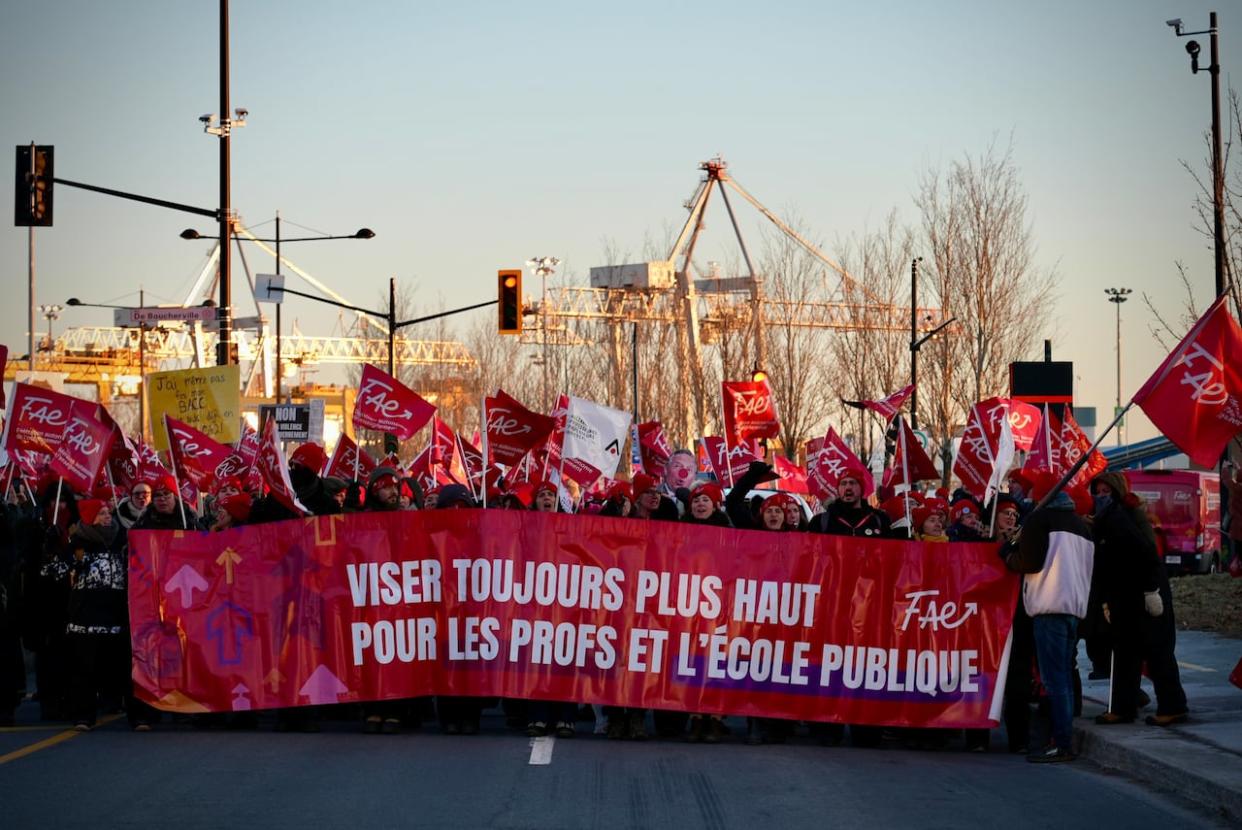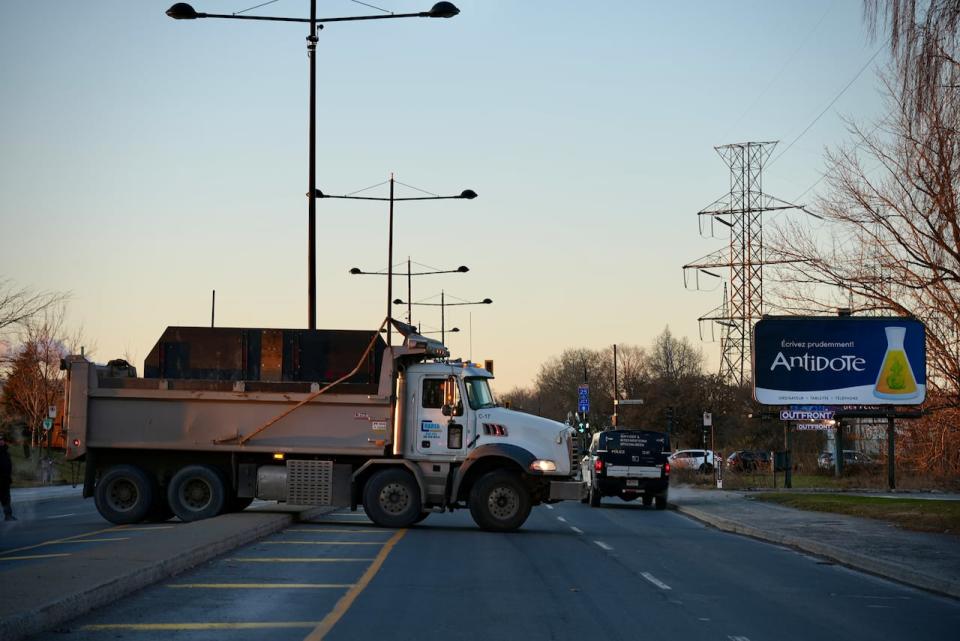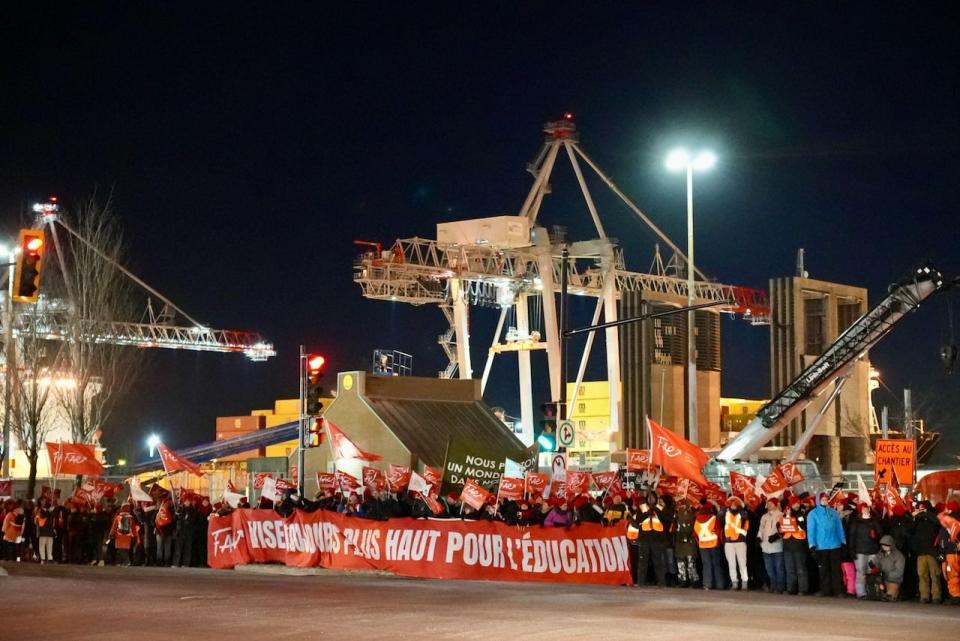Teachers on strike block ports in Montreal and Quebec City

Members of a striking teacher's union, the Fédération autonome de l'enseignement (FAE), blocked entrances to the ports of Montreal and Quebec City early Thursday morning, as negotiations with the provincial government appeared to stall this week.
The union, which represents 66,000 elementary and high school teachers in the province, rejected Quebec's latest offer Wednesday evening, calling it a "smoke screen" with significant setbacks on its demands. The FAE leadership accused the government of using a strategy of exhausting teachers, who have been picketing since Nov. 23.
Union members also blocked access to the Casino du Lac-Leamy in Gatineau at 8:45 a.m. Thursday. Union officials there also encouraged members and local residents to demonstrate outside the Outaouais offices of Coalition Avenir Québec MNAs on Thursday afternoon.
The teachers started blocking the Port of Montreal entrance at the corner of Notre-Dame and De Boucherville streets in Montreal around 6 a.m. before blocking Notre-Dame Street entirely.
Several trucks queued down the street because they couldn't access the port facilities, slowing traffic down in both directions. The demonstration ended around 8:30 a.m.
According to the Montreal Port Authority, the action had a "major impact" on port operations. Between 500 and 800 trucks, about 25 per cent of the port's morning traffic, were unable to make their transactions.

Members of the FAE blocked off Notre-Dame Street in southeast Montreal. Several trucks queued down the street because they couldn't access the port facilities. (Simon-Marc Charron/Radio-Canada)
"The boat François Legault and the government are taking us on is rocking. It's time for François Legault to assume his responsibilities as a concerned head of state and bring this boat safely to port," Patrick Bydal. FAE vice-president of politics, told Radio-Canada.
"Enough is enough. It's time for François Legault to hear us."
In an interview on Radio-Canada's Tout un matin, FAE president Mélanie Hubert said that although there has been progress on salaries in the negotiations, core issues like working conditions and class sizes remain unresolved.
Students have been out of school for four weeks, and Hubert blamed the government for slowing discussions. Teachers are itching to get back to class, she said, but only once a mutually beneficial agreement is reached.
"Our members, for many weeks, have been taking to the streets and negotiations are not going where we want them to," said Hubert.

The Port of Montreal said the strike action had a 'major impact' on operations Thursday. (Simon-Marc Charron/Radio-Canada)
Both the union and the government have said they want to reach an agreement by the holidays and Hubert said she still has hope that's possible.
Barry Eidlin, a sociology professor specializing in labour issues at McGill University, agrees.
"With labour negotiations, it's usually darkest before dawn," he said on CBC Montreal's Daybreak.
Eidlin said it would be "a huge step back" for the government to issue back-to-work legislation.
"It undermines collective bargaining and sweeps everything under the rug, instead of addressing the underlying issues that led to the crisis in the first place," he said.
Eidlin said public support for strikers has remained high, especially among those most affected like parents, who "understand the link between quality public services and quality public sector wages and working conditions."
Treasury Board President Sonia LeBel refused to comment on the strike action and the rejected offer.
A coalition of public sector unions representing 420,000 workers known as the common front, which is threatening an unlimited strike in January, has requested a 72-hour negotiation with the government blitz this week.

 Yahoo News
Yahoo News 
